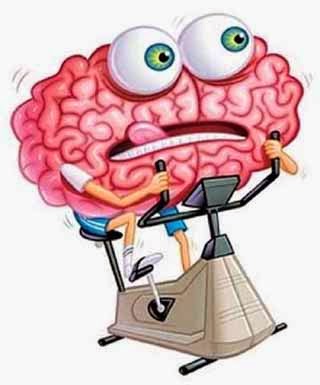We live in a time of growing excitement
about the brain. Only the preoccupation with finding the gene for everything
rivalstoday's widespread optimism regarding all things neuro
medicine(neurology, neuropsychiatry).
Perception, memory, our likes and
dislikes, intelligence, morality, whatever - the brain is supposed to be the
organ responsible for all of it. It is widely believed that even consciousness,
that Holy Grail of science and philosophy, will soon be given a neural
explanation.

After decades of concerted effort on the
part of neuroscientists, neurologist, neuropsychiatrist, psychologists, and
philosophers, only one proposition about how the brain makes us conscious - how
to gives rise to sensation, feeling, subjectivity? - has emerged unchallenged:
we don't have a clue.
In a way our problem is that we have been
looking for consciousness where it isn't. We should look for it where it is.
Consciousness is not something that happens inside us.
It is something we do or make. Better: it
is something we achieve. Consciousness, in this inventive work, rather than
being something that happens inside us, is more like dancing than it is like
digestion.
The idea that the only genuinely
scientific study of consciousness would be one that identifies consciousness
with events in the nervous system is a bit of outdated reductionism. It is
comparable to the idea that depression is a brain disease. In one sense, that
is obviously true. There are neural signatures of depression. Direct action on
the brain - in the form of drug therapy - can influence depression.
But in another sense, it is obviously not
true. It is simply impossible to understand why people get depressed - or with
this individual here and now is depressed - in neural terms alone.
Depression happens to living people with
real life histories facing real life events, and it happens not only against
the background of these individual histories but also against the background of
the phylogenetic history of the species.
The dogma that depression is a brain disease
serves the interests of drug companies, no doubt; it also serves to
destigmatize the struggle with depression, which is a good thing. Nut it is
false.
To move forward in our understanding of
consciousness, we need to give up the internal, neural microfocus. The locus of
consciousness is the dynamic life of the whole, environmentally plugged-in
person or animal. Indeed, it is only when we take up this holistic perspective
on the active life of the person or animal that we can begin to make sense of
the brain's contribution to conscious experience.
Human experience is a dance that unfolds
in the world and with others. You are not your brain. We are not locked up in a
prison of our own ideas and sensations. The phenomemon of consciousness, like
that of life itself, is a world-involving dynamic process. We are already at
home in the environment. We are not our brain, are out of our heads.
Brain Interactive is a fresh attempt at
understanding our consciousness - our minds or our brain - and how we interact
with the world around us.
우리는
뇌에 대한 열정이 점점 커져가는 시대에 살고 있다. 오늘날 신경의학(신경과학, 신경정신과학)의 모든 것에 널리 퍼져 있는 낙관주의에 대적할 만한
것이라고는 모든 것의 유전자를 찾아내겠다는 열의뿐이다.
지각, 기억, 좋고 싫음, 지능, 도덕성, 무엇이 되었든 그 모두를 책임지게 되어 있는 기관은 뇌이다. 과학과 철학의 성배인 의식조차 곧 신경으로 설명할 수 있을 것이라는 믿음이 널리 퍼져 있다.
고가의
번쩍거리는 뇌 영상 신기술이 주름잡는 이 시대, 주도적인 신문 잡지들이 과학 란에 중요한 진전과 새로운
발견을 싣지 않고 지나가는 날이 드물 정도이다.

어떤
면에서 우리의 문제는, 우리가 그동안 의식이 없는 곳에서 의식을 찾아왔다는 사실에 있다. 우리는 의식을 그것이 있는 곳에서 찾아야 한다. 의식은 우리 안에서
일어나는 무언가가 아니다. 그것은 우리가 하거나 만드는 무언가, 더
적절하게 말하자면 우리가 획득하는 무언가이다. 의식은 소화과정이 아니라 춤에 더 가깝다.
진정으로
과학적인 의식 연구는 의식을 신경계에서의 사건들과 동일 시 하는 연구뿐이라는 생각은 시대에 뒤떨어진 환원주의의 단편이다. 그것은 우울증이 뇌의 병이라는 생각과 마찬가지이다. 한 가지 의미에서, 그것은 분명 사실이다. 우울증에는 신경학적 징후들이 있다. 약물 요법의 형태로 뇌에 직접 조치를 취하면 우울증에 영향을 줄 수 있다.
하지만
다른 의미에서, 그것은 분명 사실이 아니다. 신경 용어들만으로
사람들이 어째서 우울증에 걸리는지, 또는 이 사람이 지금 여기서 왜 우울해하는지를 이해하는 것은 도저히
불가능하다.
우울증은
실생활의 사전들을 마주하고 있는 살아 있는 사람들에게 나타나며, 이런 개인사 뿐만 아니라 인류의 계통적
발달사를 배경으로 해서 나타나기도 한다.
우울증이
뇌의 병이라는 독단은 제약회사의 이익에 이바지한다. 뿐만 아니라 우울증 환자의 오명을 벗기는 데에도
이바지한다. 좋은 일이다. 하지만 분명히 틀렸다.
의식의
이해에서 앞으로 나아가려면 우리는 내부의 신경을 향해 즉 세포 수준의 작은 구조에 초점을 맞추는 미시 초점을 포기해야 한다. 의식이 있는 곳은 환경에 접속되어 있는 완전한 사람이나 동물의 역동적인 삶이다. 사실은, 사람이나 동물의 능동적인 삶에 대해 이 전일적 관점을 취할
때에만 뇌가 의식 경험에 기여하는 바를 이해하기 시작할 수 있다.
인간의
경험은 세상 속에서 타인들과 어우러져 펼치는 한 판의 춤이다. 당신은 당신의 뇌가 아니다. 우리는 자신의 생각과 감각이라는 감옥에 갇혀 있지 않다. 의식의
현상은 삶 자체의 현상처럼 세계를 요구하는 역동적 과정이다. 우리는 이미 환경이라는 집 안에 있다. 우리의 뇌는 우리가 아니다. 우리는 우리의 뇌 밖으로 나와 있는
것이다.
브레인
인터랙티브는 마음이나 뇌로도 불리고 있는 우리의 의식을 이해하는 새로운 시도이며, 우리를 둘러싼 주변
세상과 우리가 어떻게 상호작용을 하는지에 대한 해석이라 할 수 있다.